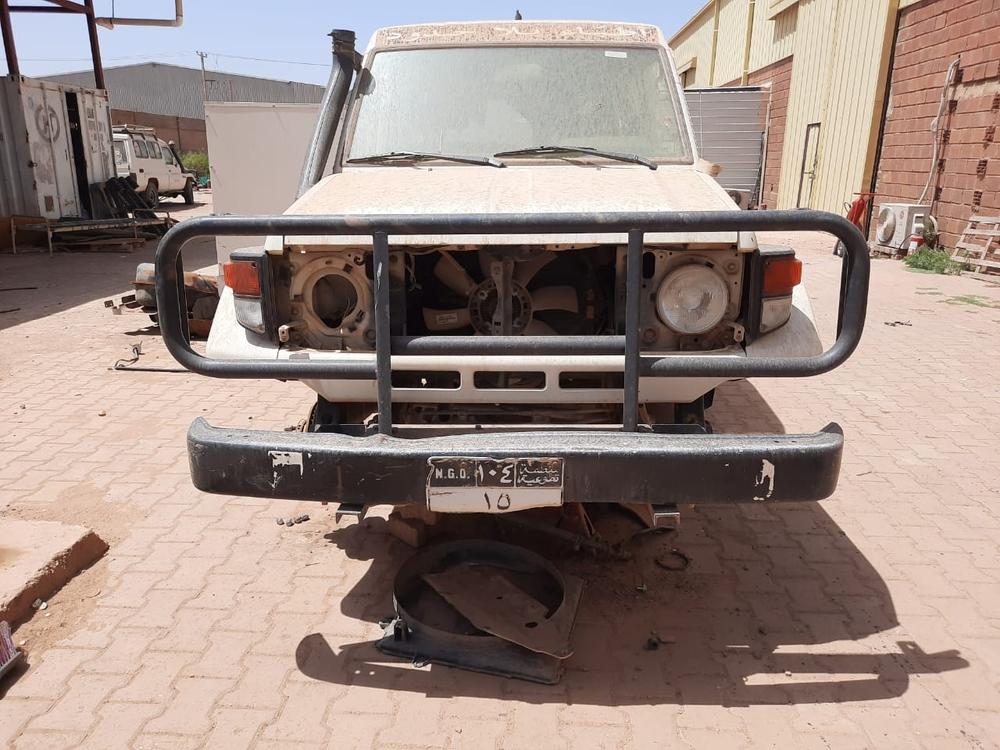Khartoum - Médecins Sans Frontières/Doctors Without Borders (MSF) condemns the unacceptable harassment of its staff and the violent looting and occupation of its medical premises and supported facilities in Sudan. Staff and patients are repeatedly facing the trauma of armed groups entering and looting MSF premises with medicines, supplies and vehicles being stolen. This shocking disregard for humanitarian principles and international humanitarian law has impeded our ability to provide healthcare to people at a time when it is desperately needed.
MSF, which runs medical projects in ten states in Sudan, has been attempting to scale up its medical activities since intense fighting broke out between the Sudanese military and the Rapid Support Forces on 15 April. These efforts have been continually hampered by violence, aggressive armed incursions, looting or armed occupation of its premises, as well as administrative and logistical challenges.
MSF calls on all warring parties to ensure the safety of medical personnel and health facilities, to allow safe passage of ambulances and people seeking healthcare and to facilitate access and rapid and unimpeded movement for humanitarian workers, organisations and supplies. Although a nationwide ceasefire was announced between the warring parties on 20 May, local ceasefires have not always been respected in the past.
“We are experiencing a violation of humanitarian principles and the space for humanitarians to work is shrinking on a scale I've rarely seen before,” says Jean-Nicolas Armstrong Dangelser MSF Emergency Coordinator in Sudan.
“After the looting of one of our medical warehouses in Khartoum fridges were unplugged and medicines removed. The entire cold chain was ruined so the medicines are spoiled and can’t be used to treat anyone.
We are shaken and appalled by these deplorable attacks. People are in a desperate situation and the need for healthcare is critical, but these attacks make it so much harder for healthcare workers to help. It’s senseless.”
There have been multiple incidents affecting MSF premises in Sudan since the conflict started, including:
- Between 16 and 20 May an MSF warehouse in Khartoum was looted and occupied with medical supplies, fuel and vehicles stolen. Medicines were spoiled.
- Between 17 and 23 May the MSF office in Zalingei, central Darfur, was looted as was the Zalingei Teaching Hospital. A generator was destroyed and fuel that MSF had donated was stolen.
- On 19 May, three MSF cars were taken after armed men entered an MSF office in Khartoum.
- On 18 May an MSF guesthouse in Nyala, south Darfur, was looted. MSF had already been forced to suspend its medical activities in South Darfur after its compound and warehouse were violently looted in Nyala on 16 April, with two vehicles stolen. The MSF warehouse remains occupied by armed fighters.
- On 11 May, an MSF office in Khartoum was looted with two vehicles stolen.
- On 4 May, an MSF office in El Geneina was looted.
- On 26 April, the El Geneina Teaching Hospital, where MSF managed the paediatric and nutrition departments, was also looted with parts of the hospital damaged or destroyed. The hospital remains closed following the attack.
These attacks are not limited to MSF and are part of a wider trend of both warring parties disregarding civilian lives, infrastructure and healthcare facilities. As of 22 May, the WHO has documented 38 attacks on healthcare since the conflict began. Hospitals and healthcare workers are protected under international humanitarian law, but there are reports of the occupation of hospitals by armed groups which can weaken their protection putting patients, healthcare workers and structures at risk.
This comes at a time when the conflict is having a dire impact on people in Sudan. People in Khartoum, Darfur and other places where fighting is most intense continue to suffer terribly amid ongoing violence, with people injured by gunshot wounds, sexual violence, stabbing and explosions. Fighting, airstrikes and other violence close to health facilities can leave both patients and staff too afraid to reach them.
Countrywide, people face shortages of food and drinking water, forcing people to be on the move to try to meet their basic needs. Access to humanitarian support and healthcare is vital but the Sudanese healthcare system is already struggling with a lack of essential supplies.
Administrative and logistical challenges are also impeding MSF’s medical activities. Moving supplies from one part of Sudan to another can be extremely difficult. Similarly, although MSF was able to bring emergency teams into Sudan during the first weeks of the conflict, it has since been challenging to obtain permission for them to travel to project locations or to secure visas for additional staff.
MSF runs medical projects in Al-Jazeera, El-Gedaref, Kassala, Khartoum, Red Sea, North, West, South and Central Darfur, and Blue Nile states in Sudan. This includes treating war wounded people in Khartoum and North Darfur, providing healthcare and water and sanitation services for refugees and displaced people in Al-Gedaref and Al Jazirah states and providing donations of medical and other supplies to health facilities. As a neutral, independent and impartial medical organisation MSF provides healthcare to people based on their medical needs alone, treating those who are most in need, regardless of whether they are on one side of the conflict or the other.
